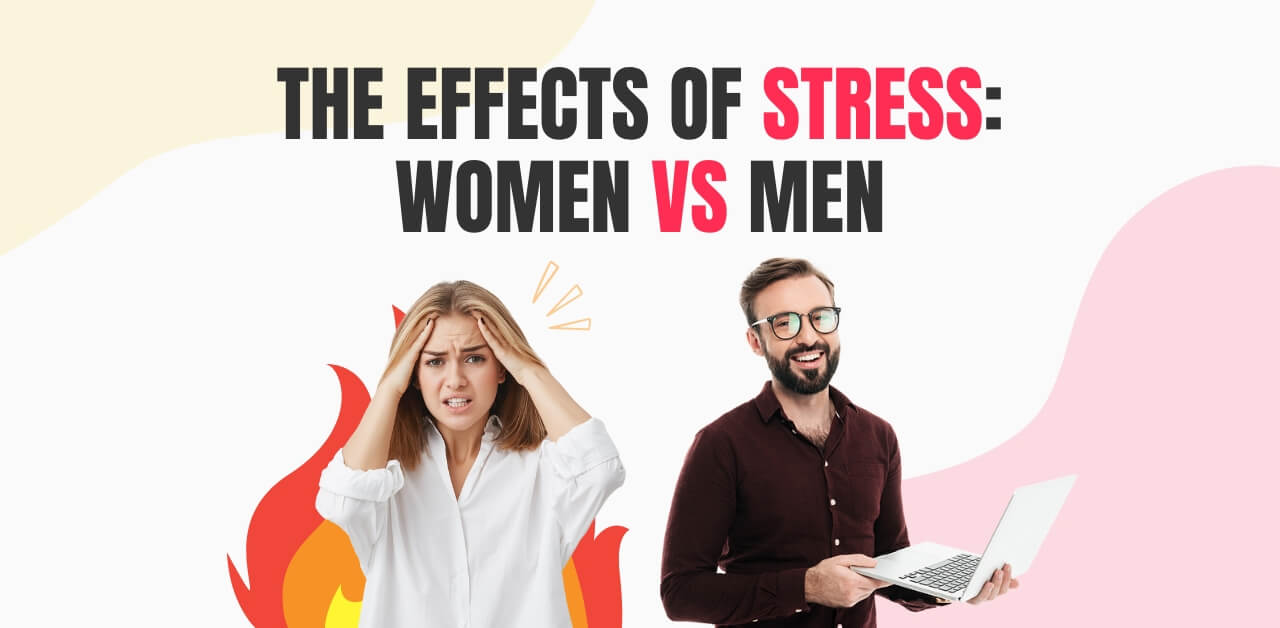A 2007-2010 study titled “Stress and Gender” involving thousands of participants by the American Psychological Association (APA) found that:
Women are more likely than men (28% vs 20%) to report having a great deal of stress.

Almost half of all women (49%) surveyed said their stress has increased over the past five years, compared to men (39%).

Women are more likely to report physical and emotional symptoms of stress than men, such as having had a headache (41% vs 30%), having felt as though they could cry (44% vs 15%), or having had an upset stomach or indigestion (32% vs 21%) in the past month.

Women are more likely to report that money (79% compared with 73% of men), and the economy (68 % compared with 61% of men) are sources of stress, while men are far more likely to cite that work is a source of stress (76% compared with 65 % of women).

Married women report higher levels of stress than single women, with one-third (33%) reporting that they have experienced a great deal of stress in the past month compared with 22% of single women.

Similarly, significantly more married women report that their stress has increased over the past five years (56% vs 41% of single women). Single women are also more likely than married women to say they are doing enough to manage their stress (63% vs 51%).


In the United States alone, nearly half of all women report higher stress levels during the holidays, while only a third of men would say the same.
The women’s health specialists at Genesis Women’s have seen how high-stress levels can be severely detrimental to overall wellness. There are many negative effects on women’s health due to high stress during the busy holiday season. Thus, it is essential to make a check-in with yourself.
Menstrual Health
According to the American Journal of Epidemiology, women who spend prolonged time in high-stress scenarios (especially at work) have a 50% higher risk of experiencing shortened menstrual cycles, meaning multiple periods in less than a month that may or may not be predictable.

Women under stress also report heavier flow than usual and more severe symptoms of pain and lethargy. Before your period begins, you may even feel more severe PMS symptoms than usual, including mood swings that can feel like genuine depressive episodes.
Mood systems
Studies on depression in men vs women have shown that women are twice as likely as men to be depressed.
Women are also at a higher risk of developing anxiety disorders such as general anxiety, Post Traumatic Stress Disorder (PTSD) and Obsessive-Compulsive Disorder (OCD).
Due to our body’s physical responses to stressors, unmanageable stress levels can trigger or exacerbate all of these conditions.
Vaginal Health
The pH (or acidity content) of the vagina is determined by a balance of healthy and unhealthy bacteria. High-stress levels can negatively affect your immune system, lowering your body’s natural defences and throwing off this delicate balance.
This can lead to a higher risk of contracting uncomfortable yeast infections and various bacterial ailments. Vaginal yeast infection symptoms include itching, burning, swelling, rashes, and thick, white, odourless discharge around the vagina and vulva.
Sex drive and fertility
Women under a great deal of stress tend to have a lower sex drive, feel distracted during sex, or may even experience discomfort due to vaginal dryness.
Women under stress also have more difficulty getting pregnant, and for those who want to build a family, this may even become an additional stressor.
Body Symptoms
Women under high stress can begin to display several physical symptoms that affect various body parts. Some of these symptoms include:
Stomach and bowel issues
Irritable Bowel Syndrome (IBS) is also twice as common in women, and stress can trigger flare-ups.
Heart problems
Prolonged stressful situations can lead to high blood pressure, increased risk of stroke and heart attack.
Headaches
Women are more prone to tension headaches and severe migraines than men, both related to or worsened by stress.
